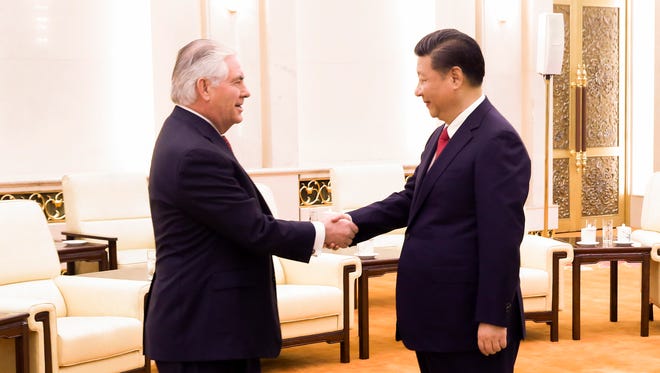Tillerson meets with China's Xi Jinping as N. Korea tests rocket engine

Secretary of State Rex Tillerson met Sunday with Chinese President Xi Jinping, talking about diplomacy and shared interests after earlier warning that the military “option is on the table" to stop North Korea’s nuclear program.
North Korea tested a rocket engine over the weekend while Tillerson was in Beijing.
In their 30-minute meeting, Xi and Tillerson agreed that China and the United States could cooperate more but acknowledged that differences between the two countries are likely to endure, the State Department said.
Tillerson spoke to Xi about common interests of the United States and China — the world’s two largest economies and greatest trade partners — and said Xi and President Trump should talk more, even after a “very lengthy telephone conversation” the two leaders already had.
Tillerson said Trump places a “very high value” on communications with the Chinese president and looks forward to “the opportunity of a visit in the future,” the Associated Press reported.
Trump harshly criticized China during the presidential campaign and since taking office, warning of changes he'll make to the U.S.-Chinese relationship on trade, North Korea and the South China Sea, where China has built fortifications on artificial islands in disputed waters.
North Korea tests new rocket engine
China urges U.S. to be 'coolheaded' in approach to North Korea
Tillerson: Military action against North Korea 'option is on the table'
Such tensions, however, were barely visible in the public statements made by Tillerson and his Chinese hosts.
Xi welcomed Tillerson with a similarly friendly tone, stressing the need for trust and mutual understanding, with an eye on long-term and strategic cooperation. He also invited Trump for a visit.
“We should properly handle and manage sensitive issues to promote the healthy and stable development of Sino-U.S. relationship from a new start,” Xi said, according to the South China Morning Post.
Such pleasantries did not prevent North Korea, whose main ally is China, from demonstrating that more than talk will be needed to change its nuclear ambitions.
North Korean leader Kim Jong Un oversaw Saturday's successful test of a new type of rocket engine that will enable “world-level satellite delivery capability,” the state-controlled Korean Central News Agency reported Sunday. Kim also announced that his country's munitions industry made a series of unprecedented successes in the past two years, KCNA said.

Such tests are banned by United Nations Security Council resolutions. Kim and his government have issued multiple statements in the past few months announcing the ongoing development of nuclear missiles that eventually could reach the U.S. mainland, a capability North Korea says it needs to prevent a U.S. attack.
North Korea tested five nuclear weapons since 2006, including two last year. It has also tested rockets that it says will deliver a half-ton payload 7,400 miles away, a range that could reach the continental United States.
While China has signed on to new sanctions against the North, analysts say China could do more to pressure North Korea, and the U.S. should impose tougher sanctions on Chinese companies that support the North’s nuclear and missile programs.
In South Korea on Friday, Tillerson declared that diplomacy to prevent the North’s pursuit of nuclear weapons had failed and that the “strategic patience” policy of former president Barack Obama is now over. Tillerson said the military force “option is on the table,” prompting his Chinese counterpart, Wang Yi, on Saturday to urge a “coolheaded” approach.